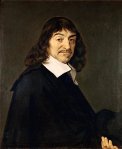The CEC
In 2002, after becoming convicted about the Papacy being God's plan for the
unity of his Church, but also believing that God had put me in Sherman with the Charismatic Episcopal Church (CEC) for a reason, I rededicated myself to working with the CEC. I focused on the good things we had in the CEC, which we believed was the best of the Catholic and Protestant traditions.
However, in 2004 I was growing more and more uneasy and uncertain about my role in the CEC. The path I thought I was on to become a priest seemed to be going nowhere, and I felt like something had to give soon. The CEC's international convocation, which occurred every 4 years, was coming up that summer in the Philippines, and my hope was that at the convocation I would somehow receive a clearer idea of what I should be doing in the CEC. With high expectations, I made the sacrifices it would take to get to Manila.
The first couple of days in Manila were filled with events of welcome from our Filipino hosts. This was a wonderful time of introduction to a beautiful and generous people that I will never forget. As the convocation proper commenced, I encountered difficulties as I experienced signs of conflict within the CEC. Still, I endeavored to not be distracted by these problems, and tried to seek some direction for my life. However, I came to the end of the convocation with no clearer idea of what I should be doing than when I started.
Transition
A few months later, something happened that definitely got things moving. The department I worked in at Nortel was eliminated, and after 11 years of working there, I was laid off. The layoff was not a big surprise considering the state of things at Nortel, but it was still a shock. Even so, I welcomed it as an opportunity for change. I soon found other work, but the opportunity for telecommuting from Sherman was gone, so we started planning for a move back closer to Dallas. The good news was that by leaving the cathedral in Sherman, which had 3 priests and 3 deacons in residence, I would be moving into a situation where my own ordination was more likely. The two possibilities that I discussed with my bishop were starting a new parish, or helping out at an existing one. We decided to move to the Denton area and help with a small existing parish there.
Things went well in Denton for a while, and plans were put in place for my ordination to the Diaconate. However, in October of 2005, a conflict arose in the Denton parish that caused me to wonder if we could continue with that parish. As I began to think about what we would do about a church home, it suddenly came to me clear and strong that now was the time for us to become Catholic. I came to believe it would be much better for us to leave the CEC before I received ordination because ordination would involve vows of obedience that I would not want to break by leaving. At that point I knew I could not in good conscience be ordained in the CEC, and that it would be better for me to be a layman in the Catholic Church.
We were just finishing a new house south of Denton, but we knew no Catholics in the area, or anything about the local parishes. We eventually found our way to the Church through the kind ministry of Fr. Allan Hawkins at St. Mary the Virgin parish in Arlington, and we were received into the Catholic Church at the Easter Vigil in 2006. After a few months going the church in Arlington, we decided we needed a parish closer to home, so we became members at St. Ann parish in Coppell.
Catholic Blessings
I was expecting that becoming Catholic would be a huge sacrifice because I would be giving up the many advantages that I believed that the CEC offered over the Catholic Church. By joining a large parish like St. Ann, we did lose the intimacy of the small churches we were used to, and the preaching and liturgy were not always as good as what we were leaving, but we gained some important things that I was not expecting.
The first thing was the beauty of the Catholic faith in its wholeness, and the joy of submission to the authority of the Church. Although we in the CEC accepted much of the Catholic faith, there were still aspects that we distanced ourselves from. Some of these things, such as Marian devotion, were difficulties for me as we approached conversion, but I made the decision to accept the authority of the Church, and relinquish any perceived right to pick and choose what doctrines I would accept. I dove head-first into Catholic doctrine, and I was surprised by the beauty I found. Once I trusted the Church to be my teacher, everything started to fall into place and make sense doctrinally. Every difficulty did not disappear overnight, but Catholic doctrine is significantly more solid, reasonable, beautiful, and practical to me than was my understanding of Christian doctrine before my conversion. There is also a great relief in not having to bear the full responsibility of determining all truth for myself. This does not mean that as a Catholic I have switched off my brain and I blindly accept everything my priest tells me. The situation is not always so clear cut, and there is always a need for discernment. However, the Church gives me so many resources that it is like I have entered a doctrinal treasure chamber.
The second thing has been the transformative power of the sacraments. I am not qualified to debate the validity of CEC sacraments, although I will say that my opinion is that they are valid. I will also say that my subjective experience is that the transforming power of the sacraments in the lives of my wife and myself is greatly increased now that we're Catholic. I know that the effect of the sacraments is dependent on the disposition of the recipient, so my theory is that Toni and I are better disposed to receive the power of the sacraments now that we are in full communion with the Church. Also, I believe we benefit from more frequent reception of communion through the availability of daily Mass.
The third blessing of the Catholic Church has been its Catholicity, or universality. There is so much diversity in the Catholic Church. Protestant denominations and congregations tend to be collections of like-minded people. Although there are definite boundaries that determine whether something is Catholic or not, there is much room for diversity within those boundaries. Franciscans, Jesuits, Carmelites, Cistercians, and many other religious orders, traditions, and groups all have different approaches to the Catholic faith and practice, and they all have their influence on the Church. As Catholics, we benefit from all of them, and can choose an approach that fits each of our personalities. Even though some parishes are run by a religious order, and each parish has its own personality, there is still a great diversity in the makeup of a typical parish compared with the typical Protestant congregation. All of this has been very refreshing and a cause of growth for me.
The Road
At St. Ann's, I soon got involved in a men's ministry, which led to me giving a testimonial presentation about the way that God had used the Scriptures in my life. Several people who heard my presentation responded with encouragement for me to do more teaching. I decided, however, that as a brand new Catholic, I needed time in the Church, and deeper instruction, before setting myself up as a Catholic teacher. I decided to begin work on a Masters in Theology degree at University of Dallas. I'm on schedule to graduate May 2012, after which I hope to do more teaching in some capacity, and/or more writing.
As I look back on the long and winding road that has brought me to where I am today, I sometimes wonder why I couldn't have converted sooner. It seems like it could have saved a lot of trouble if I had, but I also know that what I am today is a product of all that has come before. I also value all of the people whom I have come to know along the way. Whatever God has for me in the future, I believe he will make use of everything he has given me in the past, and so I thank him for his guiding hand, and trust he will be with me until the end.

